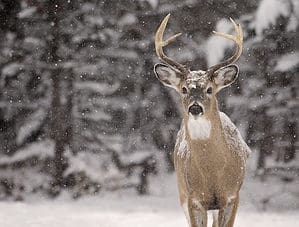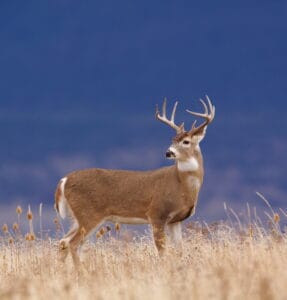The Cervidae family of animals includes hoofed ruminant mammals that most people call deer. Two of the biggest members of this family include the sambar deer and the moose. Although both species can achieve a great size, they have many unique qualities. We’ve decided it’s a good idea to show you what separates these creatures from one another. So, let’s compare the sambar deer vs. moose and see how they differ!
Comparing a Sambar Deer and a Moose
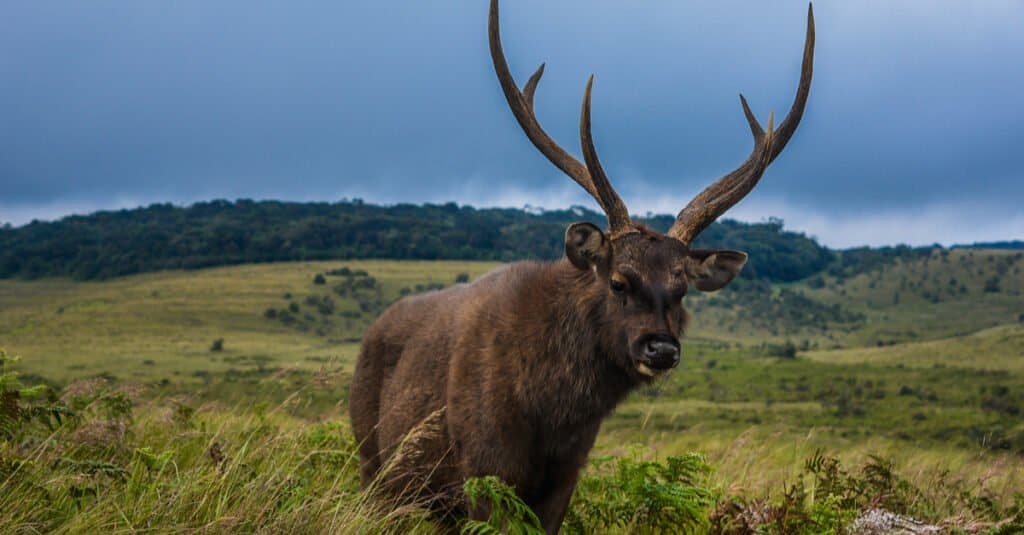
The sambar deer maxes out at 1,200 lbs, 5 ft tall, and 8.9 ft long.
©Swarna367/Shutterstock.com
| Sambar Deer | Moose | |
|---|---|---|
| Size | Weight: 240-1,200 lbs Height: 4-5 ft Length: 5-8.9 ft | Weight: 600lbs-1,500 lbs or more Height: 4.6ft-6.9 ft at the shoulder Length 7ft-10 ft |
| Species | – Rusa unicolor | – Alces alces |
| Range | – Indian subcontinent – Southeast Asia – Burma, Taiwan, south China, Thailand, Malaysia, and more – Introduced to some places like Australia and Florida – Prefers to live in tropical forests, tropical rainforests, and grasslands. | – Prefers to live near water- Far northern reaches of North America, Europe, and Eurasia – U.S., Canada, Norway, Finland, Russia, Mongolia, China, and more – Attempts to integrate them into other areas, like New Zealand, have not been successful |
| Morphology | – Heavily built body and thin legs – Amber or yellow-brown coat that turns to a deep gray – Black tail with a light underside – May grow a thin mane in fall and winter – Large antlers that measure up to 3.5 ft in length | – Large, angular shoulder hump – Has a dewlap under their chin and at the throat – Long, thin legs – Massive, elaborate antlers that demonstrate social rank – Palmate antlers that can measure up to 6 feet across – Dark brown, uniform fur throughout their body – Very small tail |
| Social Interactions | – Males mostly live alone – Females and young may live together in groups of up to a dozen or more | – Moose mostly live apart unless they’re mating or caring for their young – May live closer together in winter and during the rutting period – Females will often isolate themselves |
The 5 Key Differences Between a Sambar Deer vs. Moose
The biggest differences between a sambar deer and a moose are their size and morphology. Moose are larger than sambar deer, weighing between 600 and 1,500 pounds, standing between 4.6 and 6.9 feet at the shoulder, and measuring between 7 and 10 feet long! The sambar deer maxes out at 1,200 lbs, 5 ft tall, and 8.9 ft long.
Furthermore, the sambar deer has an amber or yellow-brown fur coat, but the moose has a dark brown coat. Although both animals have long, thin legs and a large body, the moose has a large, angular shoulder hump, a dewlap under their chin, and palmate antlers. However, sambar deer do not have palmate antlers or a dewlap but have a longer tail than the moose.
These differences are some of the things that define these species. Yet, these creatures differ in several other ways as well. Let’s take a closer look at five ways the two species are unique.
Sambar Deer vs. Moose: Size
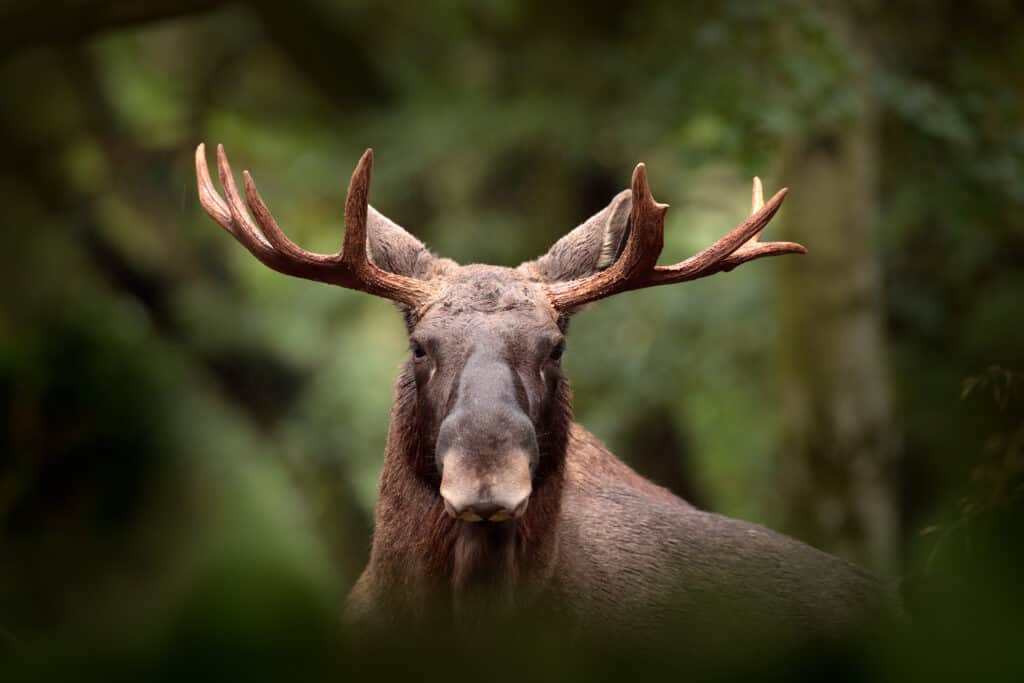
Moose stand between 4.6 and 6.9 feet at the shoulder.
©iStock.com/Ondrej Prosicky
Moose are larger than sambar deer. The low end of the average moose weight is 600 pounds, far more than the 200 pounds of the sambar deer. Furthermore, moose have a very high maximum weight that is believed to be 1,500 pounds or greater. The sambar deer can weigh up to 1,200 pounds in rare cases.
The moose is longer and taller than the sambar deer as well. Moose stand between 4.6 and 6.9 feet at the shoulder, but sambar deer measure between 4 and 5 feet at the shoulder. However, sambar deer only stand between 4 and 5 feet and grow between 5 and 8.9 feet long.
All in all, moose are larger than sambar deer by every measure.
Sambar Deer vs. Moose: Morphology
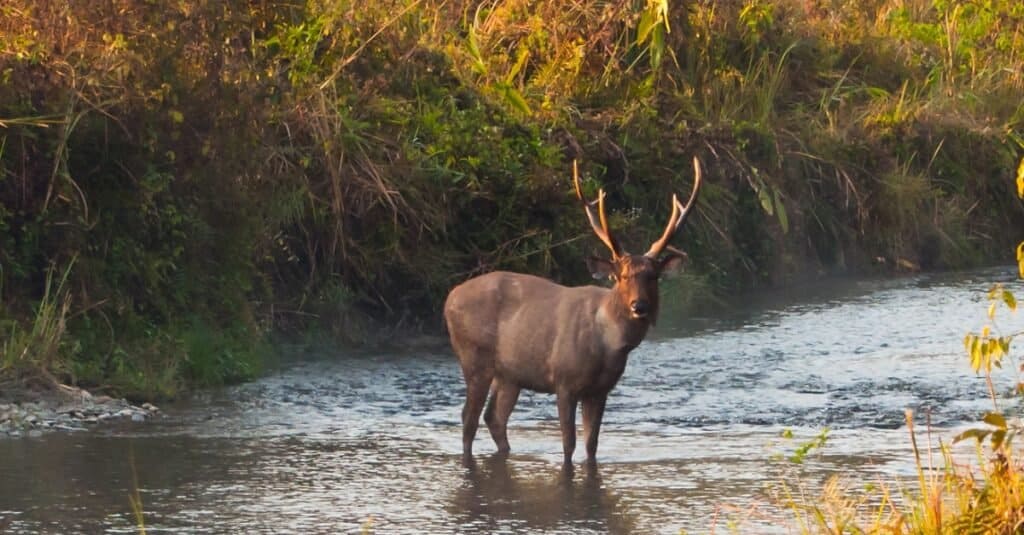
Sambar deer have a black tail that measures several inches long and a white underside.
©iStock.com/neelsky
The sambar deer and moose could look similar at first glance. They’ve both got heavily built bodies and long, thin legs. However, their differences are readily apparent. The moose is a brown creature that stays that color throughout the year. The sambar deer has amber or yellowish brown fur that fades into gray during the winter.
Also, the sambar deer and the moose have vastly different antlers. Moose have a massive set of palmate antlers that don’t have the gaps between the forked portions like one would see in other deer. Sambar deer have large antlers, but they’re very typical of the deer family with beams, forks, and points.
Other differences exist between these creatures, too. For example, the moose has a large fleshy dewlap under its chin that hangs in front of its throat. However, the sambar deer does not have one. Instead, they can grow a thin mane in the fall.
Lastly, sambar deer have a black tail that measures several inches long and a white underside. Moose have a tail so short it barely looks like a tail at all. These are just a few of the most prominent differences that exist in the bodies of sambar deer and moose.
Sambar Deer vs. Moose: Species
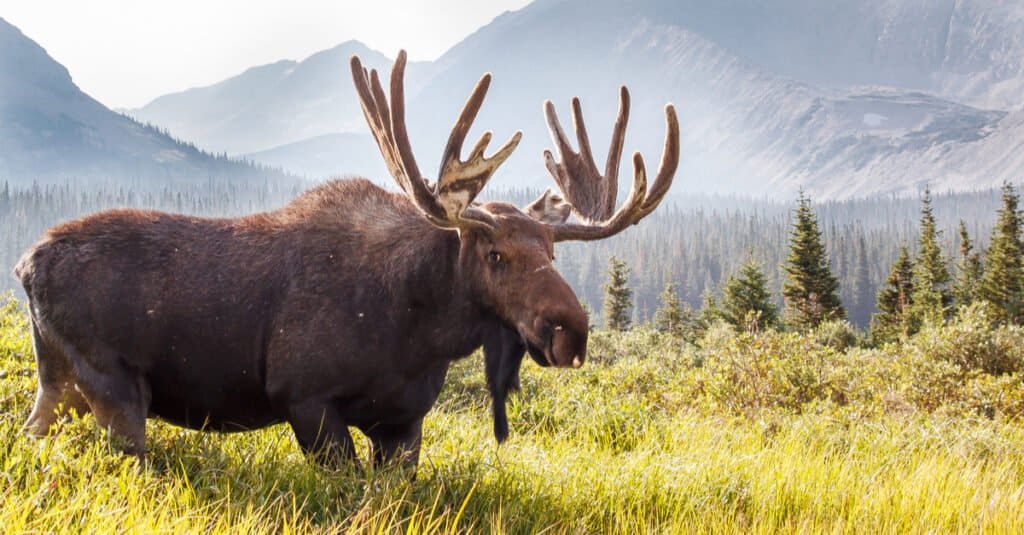
Moose are found in the United States, Canada, Russia, Mongolia, China, Finland, and many other countries.
©Michael Liggett/Shutterstock.com
Although the sambar deer and moose belong to the same phylogenetic family, they are not from the same species or genus. The sambar deer’s scientific name is Rusa unicolor, and the moose is Alces alces. They are very unique from one another, and both have a few subspecies.
Sambar Deer vs. Moose: Range
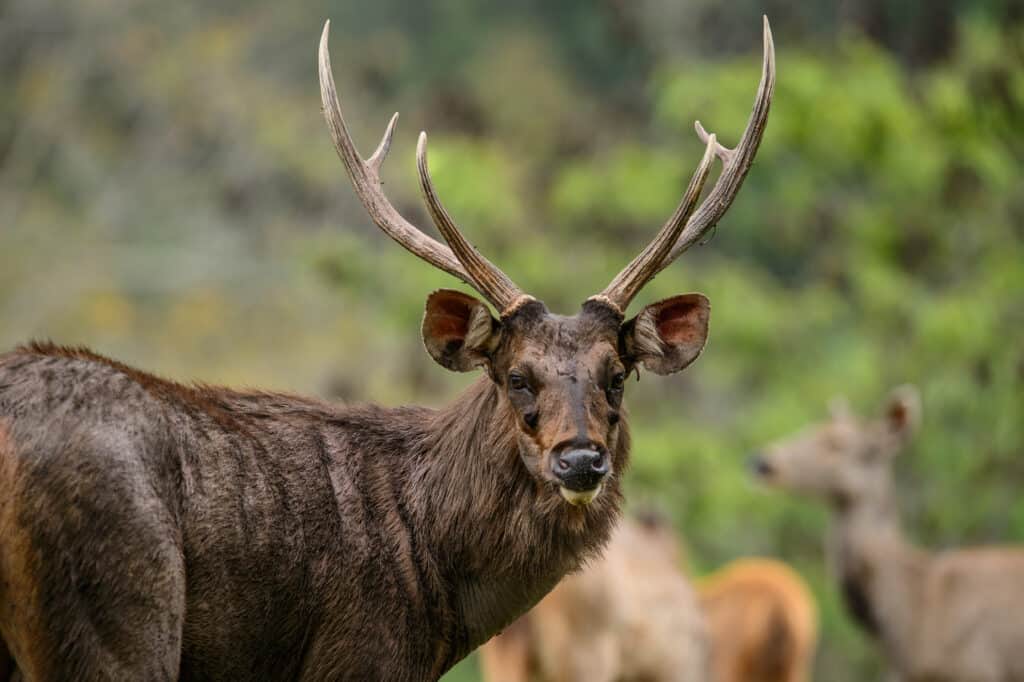
Sambar deers are found in Thailand, Malaysia, China, Taiwan, Burma, India, and Nepal.
©Signature Message/Shutterstock.com
Moose are more widespread than the sambar deer. While the sambar deer is from Asia, the moose lives across multiple continents, including North America, Asia, and Europe. Specifically, the sambar deer is found in the Indian subcontinent and Southeast Asia in countries like Thailand, Malaysia, China, Taiwan, Burma, India, and Nepal.
Moose are found in the United States, Canada, Russia, Mongolia, China, Finland, and many other countries. They are more concentrated in some parts of the world than others, but their natural range does not overlap with the sambar deer.
Sambar Deer vs. Moose: Social Interactions
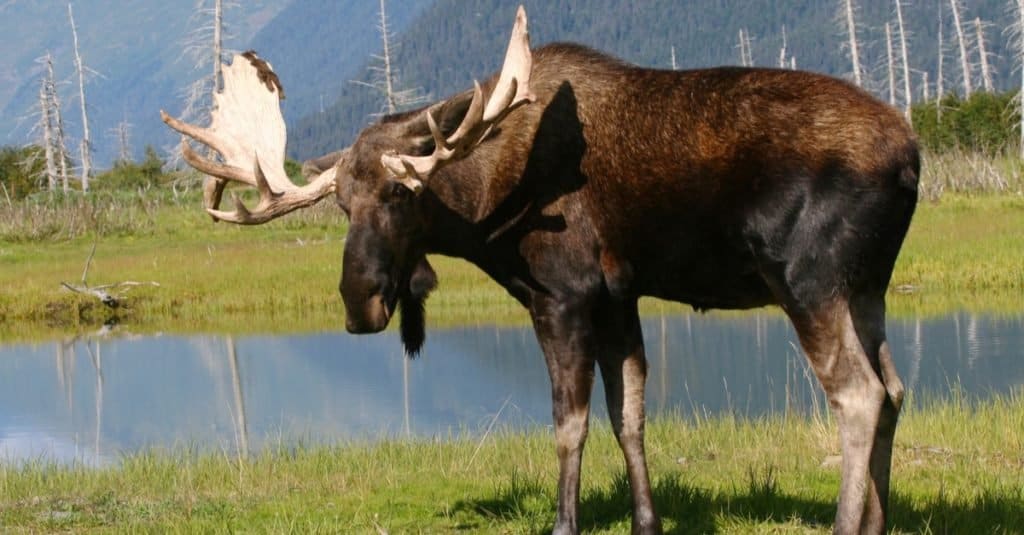
Moose are powerful swimmers. A moose can dive 20 feet underwater and stay underwater for up to 30 seconds!
©Steve Bower/Shutterstock.com
Typically, sambar deer are more social than moose. A male sambar will live alone except during breeding season, while females and youth tend to live in groups of a dozen or more. Moose almost always live alone unless they mate or care for their young.
Sometimes, moose will live closer in loose groups during the winter for survival. Other than that, they don’t live together often. In particular, females will isolate themselves from all but their young until mating season.
Final Thoughts on the Different Deer
The sambar and moose are unique creatures that are only comparable due to their size and phylogenetic family. They have enough physical differences that you could tell them apart at a glance. However, the chances of them being close enough in real life for you to examine them side by side is exceedingly low outside of a zoo.
Up Next:
- Irish Elk Vs Moose
- Moose vs Bison: What Are the Differences?
- Moose Vs Deer: What Are the Differences?
- Caribou vs Moose: What Are the Differences?
The photo featured at the top of this post is ©
Sources
- The National Wildlife Federation, Available here: https://www.nwf.org/Educational-Resources/Wildlife-Guide/Mammals/Moose
- Science Direct, Available here: https://www.sciencedirect.com/science/article/abs/pii/S0378432020305029
- BioOne, Available here: https://bioone.org/journals/wildlife-biology/volume-13/issue-1/0909-6396_2007_13_53_ASOAMA_2.0.CO_2/Antler-Size-of-Alaskan-Moose-Alces-Alces-Gigas--Effects/10.2981/0909-6396(2007)13%5b53:ASOAMA%5d2.0.CO;2.full?tab=ArticleLink
Thank you for reading! Have some feedback for us? Contact the AZ Animals editorial team.



